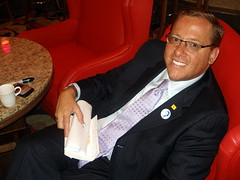March 5, 2009
Could this be the script of a political attack in the next election?
Announcer's voice (over a grainy and unflattering black-and-white photo of the legislator): "Voters in House District 24 sent Janice Arnold-Jones to the state Legislature to represent the citizens. But when it came to voting on an important bill concerning worker safety (voice begins to drip with sarcasm; cue the horror-movie music) Janice Arnold-Jones couldn't be bothered." (Show printout of roll-call vote House Bill 628; close-up on the blank space next to her name.) Call Janice Arnold-Jones (flash her home phone number) and ask her why she doesn't have the time or the courage to vote on major legislation."
No, don't really call her.
Arnold-Jones, R-Albuquerque, insists she did vote on HB628.
She pushed the button at her desk on the House floor to vote, and, she said, the red right lit up on the board that allows onlookers on the House floor and gallery to see how each member voted, indicating she voted "no," as she intended.

But after the vote, a House colleague pointed out to Arnold-Jones that the printout of the roll call on the bill did not register any vote for her.
Her vote wasn't decisive. The bill — which deals with lawyers being present during inspections of businesses by the Environment Improvement Board — failed by a 10-vote margin — 11 when you include Arnold-Jones' vote.
"It looks like I took a walk on the vote," Arnold-Jones told me. The printed record is what constituents — and researchers hired by political rivals — look at around election time.
Skipping votes can become an issue in a campaign. In 2002, Bill Richardson, running for his first term as governor, ran devastating ads against his Republican opponent, who was a state House member, for missing several votes. "John Sanchez didn't show up for work," was the disapproving catch-phrase in those ads.
There was a back-and-forth on the House floor between Arnold-Jones and Speaker Ben Luján on Wednesday. Luján said House members have to be careful. "If you just slightly hit the button, (the light) goes off again," he said. When Arnold-Jones asked that the record reflect her "no" vote, the Speaker initially hesitated, saying he didn't want to start going back and letting members vote on bills they'd missed.
But he finally relented, and no House member objected to counting Arnold-Jones' vote on HB628.
Arnold-Jones said she's convinced there's something wrong with the House electronic voting system.
"It really makes you wonder how often this happens," she told me. She doesn't believe the mistake happened on purpose. "It could easily happen to any of us," she said.
Steve Arias, chief clerk of the House, said he doesn't believe there's anything wrong with the voting system. He told me he did run a test on the system after Wednesday's floor session, and nothing appeared to be wrong.
On Tuesday, Arias said, his staff had to replace the buttons used by Rep. Ben Rodefer, D-Corrales, which, he said, had stopped working. "We tested the system three times after that, and it worked fine," Arias said.
Arias said the House first began electronic voting in 1980. The computer "brain" was upgraded in 1994. "Then there was another computer upgrade three or four years ago, and we got a new vote board," he said.
The Senate, by the way, has no electronic vote board. The votes there are done verbally or by show of hands.
Although Arias doesn't believe there is a systemic problem with the House vote apparatus, Jones is sure there is. She said she asked a sergeant at arms to bring her the printout for each floor vote.
Colón seeks second term: State Democratic Party Chairman Brian Colón announced this week that he's seeking a second term.

If he's got any opponents, they've been awfully quiet about it.
Although Colón can't — and indeed, doesn't — take complete credit for the Democratic sweep in New Mexico last November, the fact his party won the state's electoral votes for Barack Obama, took all three congressional seats and the vacant U.S. Senate seat, and picked up a six seats in the state Legislature does give Colón some pretty good bragging rights for his re-election.
As he said in his e-mail announcement, "We funded and ran a nearly $2 million coordinated campaign to insure that while the Obama Campaign was working to elect Barack Obama, our local candidates had resources to grab his coattails and ride them to victory."
Not surprisingly, Colón's announcement says nothing about one of the Democrats' less lustrous moments last year — the February presidential caucus, which brought complaints about inaccurate voter lists, inadequate numbers of ballots and general confusion. Plus, it took a couple of weeks to get the final results — in which Hillary Clinton barely edged Obama. A promised public summit concerning the future of the caucus was canceled in April and never rescheduled.
Colón is a strong ally of Gov. Bill Richardson. In a recent opinion piece in an Albuquerque paper, Colón claimed the federal grand-jury investigation into an alleged state pay-to-play scheme was politically motivated. Colón served as treasurer of a Richardson public charity, the Moving America Forward Foundation, which has refused to disclosed contributors and expenditures.




